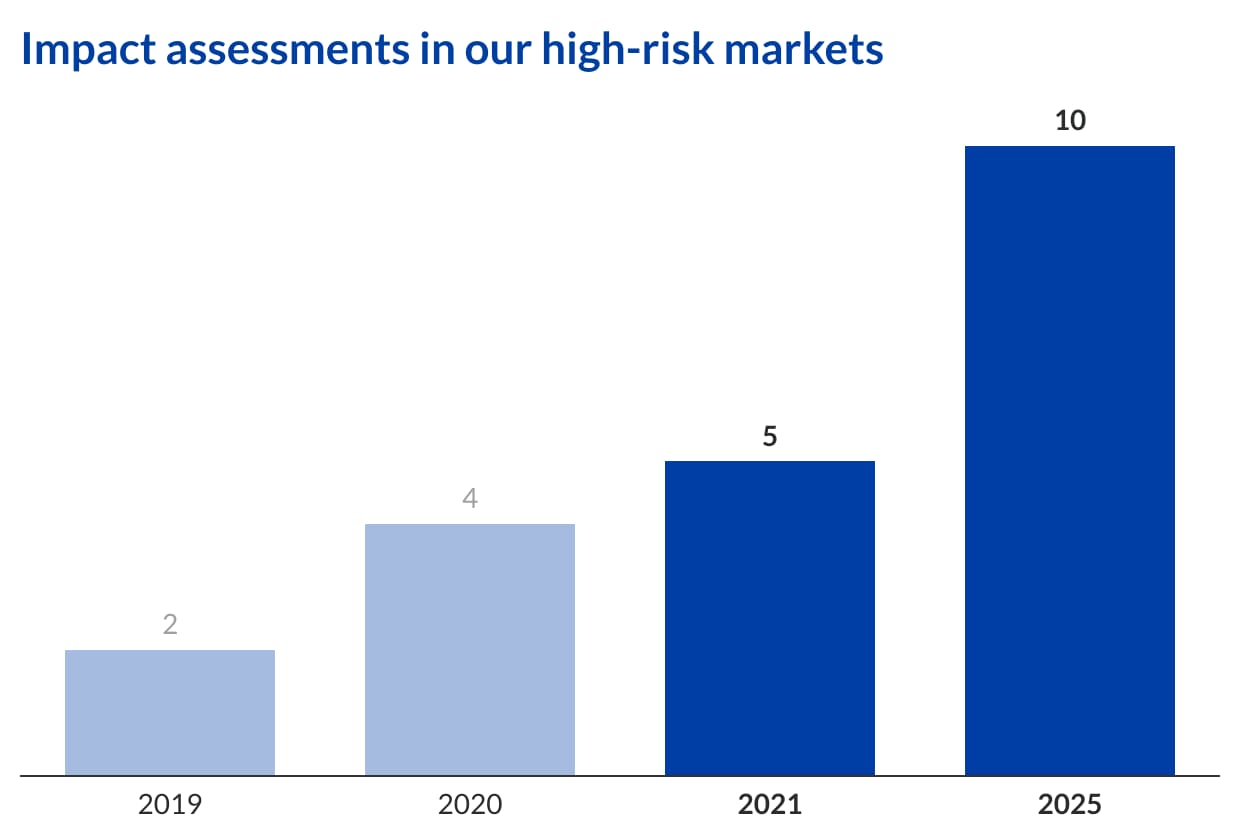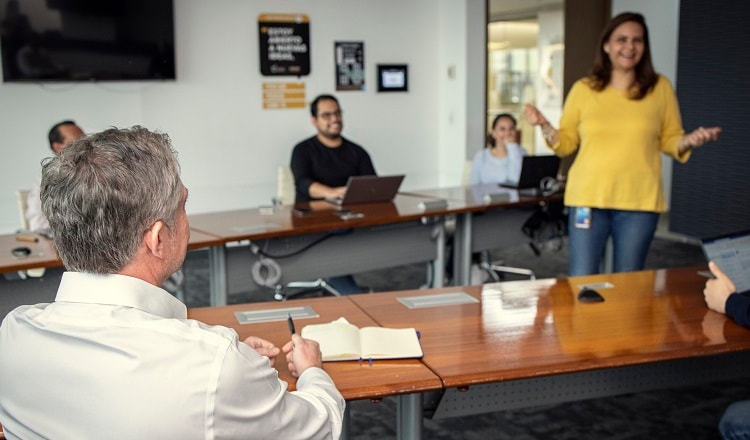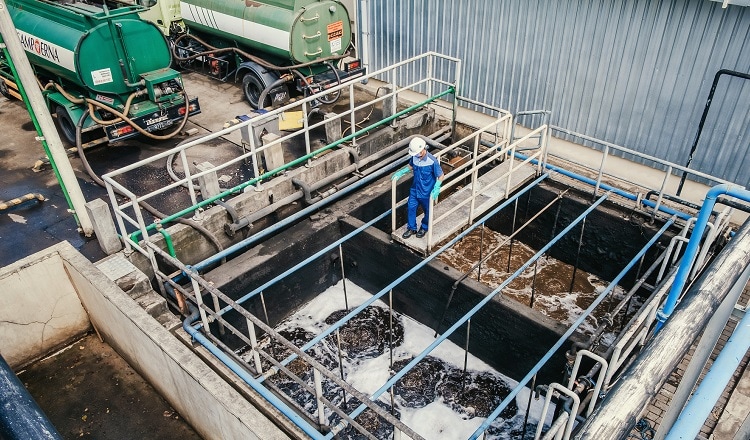Human rights are inherent to the dignity of human life and a prerequisite for society to prosper. The United Nations Guiding Principles on Business and Human Rights (UNGPs), as well as academia and civil society, recognize that businesses can impact human rights both positively and adversely and should account for and manage these impacts. At PMI, fostering the promotion and continuous integration of human rights considerations into our strategy, policies, and business practices is not just the right thing to do; it also helps anticipate evolving legal requirements and minimizes our financial exposure and the risk of supply chain disruptions. Further, safeguarding and promoting human rights within our value chain creates the basic environment and conditions in which our stakeholders, including our employees and workers across our supply chain, can thrive and create value. In combination with a positive, inclusive culture and sound management, this provides the space and opportunity needed for our key business enablers of innovation, collaboration, continuous improvement, and execution.
Our approach
Across our value chain, we aim to address our adverse impacts and maximize opportunities to drive positive change for people. Setting a strong foundation and integrating mechanisms that promote respect for human rights into our organization are essential. While this can be challenging given the scope and complexity of the issues and the breadth of our operations, we believe that human rights are an absolute and universal requirement—a requirement we are committed to upholding.
We seek to continuously improve our policies and practices with respect to identifying and addressing risks and impacts to “rights-holders” across our value chain by securing our supply of raw materials responsibly.
To strengthen our due diligence framework, proactively identify risks, and mitigate potential adverse impacts in our operations and value chain, we have set an ambition to conduct human rights impact assessments (HRIAs) in the 10 highest-risk countries in which we operate by 2025. Our HRIAs are carried out by independent expert organizations and follow a formal process aligned with the UNGPs. They result in tailored action plans, which we monitor and report on.
Our efforts to safeguard and promote human rights underlie many of the activities and programs described throughout this report. A dedicated cross-functional team at our central operations coordinates our approach.
This umbrella approach is grounded in the UNGPs and centered on four pillars:
- A sound policy framework: Our work is governed by PMI’s Commitment to Human Rights, which is complemented by other PMI policy instruments such as our Guidebook for Success, Responsible Sourcing Principles, Good Agricultural Practices, Marketing Codes, and internal policies such as our Workplace Integrity Policy. Together, these mechanisms guide the implementation of PMI’s Commitment to Human Rights along our value chain. Awareness-raising and training help us embed those instruments and an ethos of respect for human rights within our corporate culture.
- Rigorous due diligence: We have robust programs and processes in place to identify our adverse impacts across our value chain. These include our company-wide integrated risk assessment, human rights saliency mappings, and HRIAs. We also deploy targeted due diligence programs focused on areas of potential risk, such as in our tobacco and electronics supply chains, as well as external assessments and verifications.
- Remediation: We implement measures aimed at addressing adverse impacts and maximizing opportunities to drive positive change for people across our value chain. We seek to collaborate with civil society organizations, governments, and the private sector on initiatives to design and deploy strong and impactful solutions.
- Transparency: A complex global value chain brings potential human rights risks that we need to understand, manage, and continuously address. Transparency on our progress and challenges through our annual reporting and targeted communications is key to our approach.
Moving forward, we will increase our reach by translating the modules into additional languages.
In addition, we hosted tailored training sessions for the executive teams in our Middle East & Africa Region to raise awareness of human rights risks there and address them proactively.
Identifying human rights risks in our electronics supply chain
Following the refresh of our global human rights saliency mapping in 2020 (see details in our 2020 Integrated Report), we undertook an analysis of our electronics supply chain, which we completed in early 2021.
In collaboration with Article One, who are leading advisers in the business and human rights arena, we mapped and prioritized salient human rights risks for our extended electronics supply chain, which includes our electronics manufacturing services and mechanical and electrical components. This assessment validated some of our existing assumptions around potential risks and surfaced new ones that were less apparent to us. These ranged from working hours and wage-related risks in the subcontracted services supply chain, to the responsible sourcing of minerals, metals, and plastics.
We then assessed our current risk-mitigation instruments and mechanisms and benchmarked them against international standards and other industry practices. This allowed us to develop recommendations to strengthen our risk identification and response and further build our capacity to address salient risks.
The exercise demonstrated that our visibility and risk management was robust at the tier 1 and tier 2 supply chain levels, as well as for specific minerals—such as cobalt and tin, tantalum, tungsten, and gold (3TGs)— at the tier 3 level and beyond. It highlighted PMI’s potential to influence human rights performance through direct engagement and capacity-building activities, as well as through the continued integration of circularity and social responsibility principles in our product development processes. This exercise also affirmed that our visibility into the upstream plastics supply chain and subcontracted services contracted by our tier 1 and tier 2 suppliers remains limited. Accordingly, this is an area of opportunity for PMI to use its leverage to advance respect for human rights further upstream in the electronics supply chain.
Conducting human rights impact assessments in our highest-risk markets
A critical component of our due diligence framework is having independent expert organizations carry out HRIAs in our highest-risk markets in accordance with the UNGPs. After each assessment, the third-party organization presents its findings and suggests ways to address issues identified. The report is shared with the corresponding market leadership team, which develops a time-bound action plan in collaboration with the relevant corporate function, assigning responsibilities for implementation and progress measurement at the local level.
The cumulative learnings from each HRIA we have conducted since 2018—along with the monitoring of their action plan implementation— help us to become more demanding, professional, and sophisticated in our approach. We aim to assess our 10 highest-risk markets by 2025.
The completion of a second HRIA planned for 2021, in Malaysia, had to be postponed to 2022. Because of the COVID-19 pandemic and related precautions, the exercise is now designed to be conducted virtually.
This has necessitated pre-assessment trainings and capacity building to ensure our local colleagues are sufficiently familiar with the concept and purpose of the assessments. Involving our local teams in the HRIAs is essential to maximize the value these assessments bring both to the market and to the rest of our organization. Each HRIA informs the way we operate and inspires adjustments to ensure the protection and promotion of human rights.
The HRIA in Malaysia will incorporate potential human rights risks resulting from our downstream supply chain for the first time, including some of our IQOS retailers. We kicked off the HRIA in September 2021 and plan to communicate findings in our next report. Future assessments will be conducted in person once the public health situation allows it.
Throughout 2021, we continued monitoring the implementation of actions recommended by previous HRIAs in Mexico, Mozambique, Russia, and the Philippines. The local teams are strengthening their internal policies and practices as they execute their action plans.

Empowering our low- and medium-risk countries to assess human rights impacts
To ensure all countries are assessed, not just those
at highest risk, we piloted a new type of HRIA
process and toolkit in 2021 aimed at enabling our
medium- and low-risk country affiliates to self-identify salient human rights risks in their markets
and develop action plans to address them.
The tool was piloted in our Benelux market (Belgium, the Netherlands, and Luxembourg), with a focus on identifying human rights risks before they could have a significant adverse impact. The Benelux team developed a practical action plan with short-term objectives that allowed it to meet and exceed evolving standards and stakeholder expectations across all three markets.
Our affiliate in Mexico also participated in the pilot phase of the human rights self-assessments. This exercise had a two-fold objective: To account for potential risks related to the pandemic and to evaluate the status and progress of the action plan implementation following the 2018 HRIA (read more here). The self-assessment in 2021 confirmed that we had strengthened our practices across all areas identified in 2018. Moreover, engagement with external and internal stakeholders shed light on the need to focus on three additional topics: (1) protecting employees’ work–life balance while working from home; (2) promoting equal conditions for women and men, considering that women are often responsible for childcare; and (3) supporting employees’ mental health.
We will fine-tune our self-assessment toolkit with learnings from these pilots prior to rolling it out more broadly in the second half of 2022.
Exploring climate justice—the intersection of human rights and climate change
We recognize that climate change impacts not just the environment but also people’s economic and social well-being. Climate change has exacerbated human rights issues and disproportionately affects the most vulnerable people around the world.
Grievance mechanisms
Providing access to effective grievance mechanisms in our operations and across our supply chain is a key requirement of the UNGPs and a core element of our due diligence approach.
Internally, we maintain clear policies, run regular training, and work to ensure that robust processes are in place to encourage employees to speak up if things don’t seem right or can be improved (read more on page 207 of our Integrated Report). The same applies to our supply chain, where our Responsible Sourcing Principles (RSP) specifically ask suppliers to provide their workers with easily accessible ways to raise concerns, free from risk of retaliation. In our tobacco supply chain, our Agricultural Labor Practices (ALP) Code states: “Workers should have access to a fair, transparent, and anonymous grievance mechanism.” Such mechanisms are available in some countries where we source tobacco and concerns can be raised with field technicians at any time.
We continue to review and look for opportunities to strengthen further the grievance mechanisms that exist in our operations and value chain.

Human rights—topic overview
Read moreThis online content about our Integrated Report should be read in conjunction with PMI’s 2021 Integrated Report. The information and data presented here cover the 2021 calendar year or reflect status at December 31, 2021, worldwide, unless otherwise indicated. Where not specified, data come from PMI estimates. Please also refer to 'This report at a glance' on page 5 of the 2021 Integrated Report for more information. Aspirational targets and goals do not constitute financial projections, and achievement of future results is subject to risks, uncertainties and inaccurate assumptions, as outlined in our forward-looking and cautionary statements on page 252. In the 2021 Integrated Report and in related communications, the terms “materiality,” “material,” and similar terms, when used in the context of economic, environmental, and social topics, are defined in the referenced sustainability standards and are not meant to correspond to the concept of materiality under the U.S. securities laws and/or disclosures required by the U.S. Securities and Exchange Commission.



